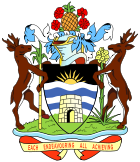| President of the Senate of Antigua and Barbuda | |
|---|---|
 Coat of arms of Antigua and Barbuda | |
since 25 June 2014 | |
| Style | The Honourable |
| Term length | Five years |
| Formation | 1 November 1981 |
| First holder | Luther Reginald Wynter |
| Salary | 42,000 XCD annually [1] |
 |
|---|
President of the Senate of Antigua and Barbuda is the presiding officer in the Senate of Antigua and Barbuda. Prior to conducting any other business, the Senate must elect a senator to serve as president when it convenes following a general election. [2]
If the position of president becomes vacant at any point before the next dissolution of Parliament, the Senate must elect a new senator to serve in that capacity as soon as is practically possible. [2] Prior to conducting any other business besides electing the President at the Senate's first session following a general election, the Senate shall elect a senator to serve as Vice-President. If the position of Vice-President becomes vacant at any point before the next dissolution of Parliament, the Senate shall, as soon as is practically possible, elect another senator to fill the position. [2] A senator cannot be elected by the Senate to be President or Vice-President if they are also serving as a Minister or Parliamentary Secretary. [2] When the Presidency is vacant, the Senate is not allowed to conduct any activity (except from the election of a President). [2]
If the business before the Senate in that meeting makes the Attorney-General's presence desirable, the President, Vice-President, or other member presiding in the Senate may request that the Attorney-General attend that meeting. When such a request is made, the Attorney-General may participate in the meeting solely for the purpose of explaining the matters before the Senate in that meeting. [2]